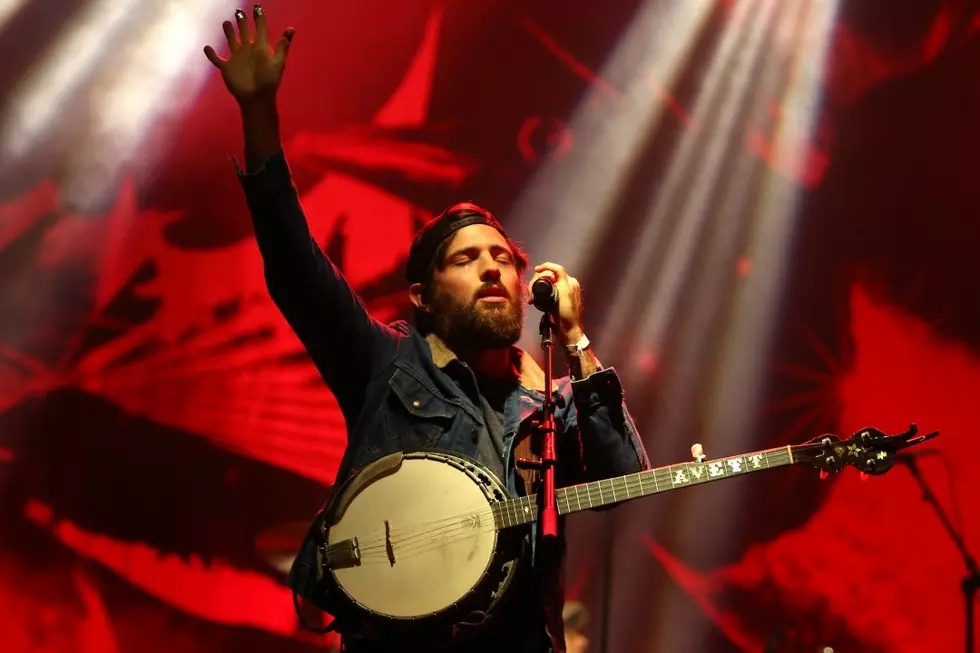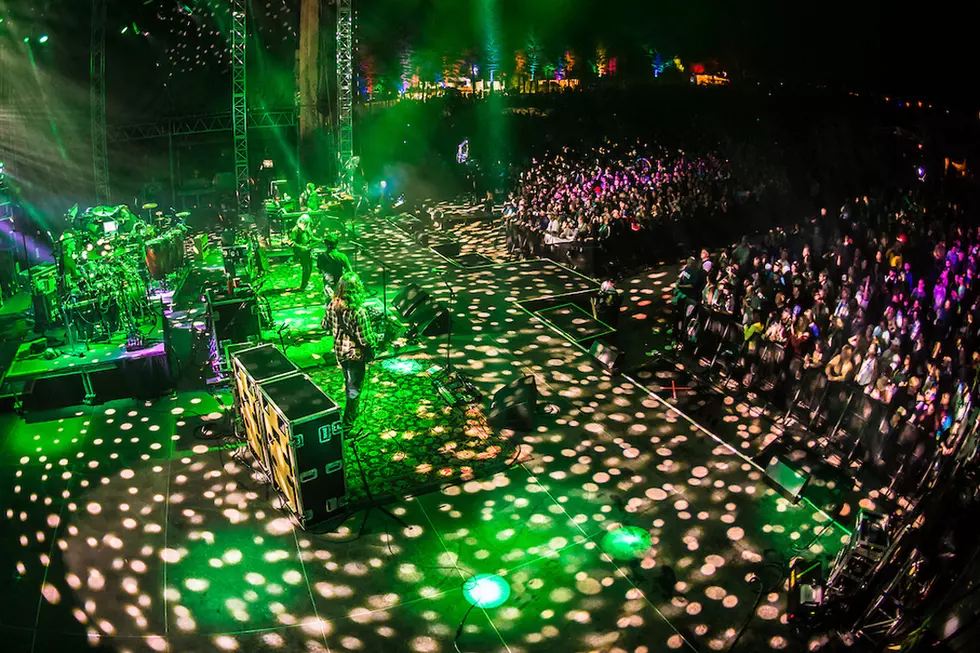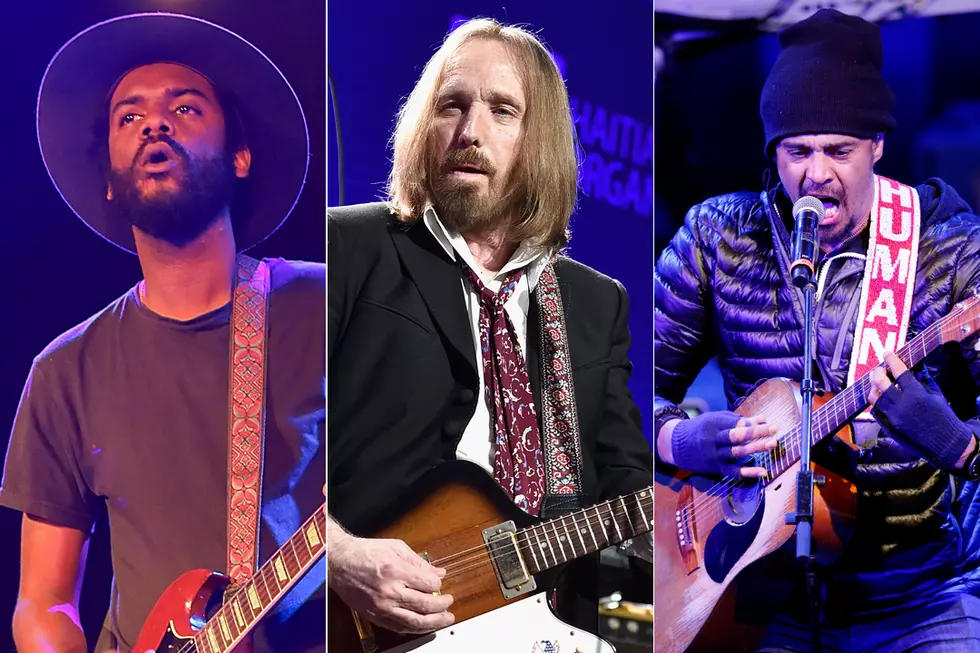
Exclusive Interview – The Avett Brothers Talk Festival Shows, Collaborations and New Music
The Avett Brothers have long been unwavering road warriors, spending the better part of their decade-plus career traversing city to city while managing to put out eight full-length records. As they wrap up a tour with Old Crow Medicine Show, the band is full steam ahead for a string of summer festival dates that circles around to the Mountain Jam fest on June 6.
Highway-bound reflection has always served as a point of inspiration for Scott and Seth Avett and their group. So was par for the course with 2013’s ‘Magpie and the Dandelion,’ a record that explored and refined their intermingling of jangly, banjo-pop with darker strains of Americana. Although written parallel to the preceding ‘The Carpenter,’ more than ever this time around the band drew on its sprawling history.
“We took a breather at home, which is really a lot to speak of because it was about 24 hours,” Scott Avett explains of their short break before joining Old Crow on tour in support of ‘Magpie’. “It’s a new year with new things happening.”
In our interview with Scott Avett, he talks about writing while on the road, how a recent collaboration has sparked new material and their upcoming tour dates, including Mountain Jam this summer. You can buy tickets to that New York festival here.
With almost no time between releasing this album and touring, it seems like you’re happy to give fans a set list that really spans a lot of your work. I noticed ‘Skin and Bones,’ ‘Apart From Me’ and ‘Open Ended Life’ have been making regular appearances. As far as your new material, what have you really enjoyed incorporating?
We just had a three-day stay in St. Louis, and I found that we have the most fun as a band when we disregard releases. You try to remove yourself from that as an artist because there’s nothing like feeling like a number. Those things are just distractions when it comes to making a work of art. Which, for me, the moment from the beginning to the end of the show each night is a medium and an opportunity to create. With that in mind, we try to make the choices for the most recent songs relevant to where we’re at personally or as a band. Sometimes that happens out of art’s sake – sometimes we’ll say, ‘I want to see what happens to a song like ‘Skin and Bones,’ which is actually an older song but just recently released, when we play it.’ Because these songs all change so much. When you look at a person like Bob Dylan and his set list and what he performs now versus what those songs sounded like when they were released, they’re just completely different animals. And that comes from playing them over and over and over and how the artist adapts.
So the choices with those have to do with maybe exploration, and wanting to delve into what the material has to offer for us and expressing that to the crowd, to let them see that evolution. We were talking this morning on the bus about analyzing the whole incorporation of the shows, and we’re not analysts. We’re performers and in a lot of ways we need to remain animals and keep it simplified.
You open your new album with ‘Open Ended Life,’ a song with this idea of being on the road and not being tied down. You haven’t had much of a break with touring since before this album came out or for the past decade for that matter. I thought that really showed up on the album – for instance, ‘Good to You’ and ‘Apart From Me’. With this new album, how did you use all that time on the road as material? As you lives are changing, how do you see that evolving?
We really try to strike a balance as far are our anchor at home remaining solid and maintaining that as well as we can. And then throwing ourselves out here and there and being able to fall back on that anchor and keeping that solid ground. I think that’s very important for us as men who want to have somewhat of a conventional dialogue with our fellow friends and neighbors. It seems like it could be tempting and easy to get a bit lost on the road and disillusioned or jaded by just throwing yourself into a whirlwind of it. It sort of looks like that from an outsider looking in. You look at a schedule and you can easily just connect all the dots and say, ‘Wow, this person never stops moving.’ But there’s a lot of time in between, if utilized correctly, that’s quiet and family-oriented and healing and meditative. It’s important to use that, though.
I’m sometimes a poor judge of my own time because I’ll come off the road and shift gear into visual art, which is another high gear. And then the next thing I know I’ve spent up all the time I was supposed to be meditative. And I’ll spend it digging another hole which may or may not yield art but just be another big lesson. It’s a lesson I’ve experienced over and over and I’ve failed and made mistakes at it over and over again, as of recent, even. But you lean on the people that love you and your community and they seem to take care of you.
Plus, you wrote a lot of this album around the same time as ‘The Carpenter,’ and with playing so much, when did you find time for all that writing?
You know, you’re parked at a hotel like right now, just waiting. There’s always things flowing in your head and you can’t necessarily be with the family members you love or at home, so it’s kind of nice to find work to do. And always keep those concepts and writing in your mind. But at the same time, you also have to just flip channels and do nothing.
It’s that idea of having to walk away from something for a while and come back to it.
And I think it’s good sometimes just to throw it all away and maybe you walk away from it indefinitely. You’ll eventually get pulled back. But don’t worry about the schedule or what’s next, and realize that if it’s over now then that’s okay and you just keep moving. I think it takes care of itself naturally and spiritually.
You’ve passed the decade benchmark with the release of ‘Magpie,’ but at the same time you’ve described this record yourself as having a feeling of “young wonderment” and not being so self-assured of where you’re at in this point of life -- you even include a live version of a past song as a young band, ‘Souls Like the Wheels.’ When so much of this was written alongside ‘The Carpenter,’ is part of that reaching back and getting in touch with your past and roots?
I think one of the things that makes all writers writers and all artists artists is this documentation and recollection that’s tough to let go. You don’t want to get stuck in this entire nostalgic existence where regret and memory and all those things swirl constantly and you never can be in the moment. That’s a very dangerous place to be. And, in a lot of ways, it’s worthless as a way of everyday living. Just like being too caught up with the future. But when it comes to telling stories, you have to have a memory and there has to be some reference point. And I think it was important that there was a mixture as our past has grown longer and gone further back and our existence together has spanned a little further, I think now we have broader points of view and perspective spanning time and space and I think they had to be included in this record. They may not have to be included in the next. The next record may need to be very much in the present.
While we’re talking about the past, on this album’s commentary, during ‘Open Ended Life,’ you made a point to say you drew on your love of Willie Nelson, Merle Haggard and Waylon Jennings, saying, “We love that outlaw country world.” Do you find yourself continuously digging deeper into that as time goes on?
As we fell into a bluegrass and old-time world early on, the reality was what was played most in our house was country and at the time that style of country was very prevalent and contemporary. We really did grow up on that and were familiar with it quite a bit. It’s easy for us to relate to. One interesting thing that I’ve thought about, and commented on, as of late is our band does a little bit of a method acting thing where we become a band for certain venue, a band for certain seasons. We change and we take on a different character and that’s one of the mixtures that’s part of the equation for us. It’s interesting to see how uncontrollably that happens. One night, there just might be much more of that vibe than another night. I definitely see us taking on this character as a band and then another night taking on a different character, which is maybe more rock and another which is maybe more of a string band. It’s all part of the mix.
You’re out with Old Crow Medicine Show now about to play a sold out gig but you have a full string of festival dates coming up. Looking into this summer, how are tour stops like this different from your experiences playing festivals?
The nature of the venue and the time of the year are part of it, with more time spent inside and less activity. This morning it was 12 degrees, so we’re kind of stuck. But you get more focus, more preparation. Which can be good and bad. In the festival season, you get less preparation so in a great way you stumble on stage and just engage and go. When that is natural, when that is appropriate and it’s right for how you’re feeling, you can’t beat it for the moment. At the same time, with all we put into these set lists and the time and effort put into preparing for a show, with as many people as we’ve got involved in it now, and especially when you have a co-bill like this with Old Crow, you feel obligated and very proud to present to the crowd. So that’s a very different thing. There’s a little less concern about that when it comes to festival time. It is sometimes more of this celebratory blur and excited blast into the air that can have a really beautiful reach; they’re both really brilliant and awesome experiences.
You’ll be at Mountain Jam again this year for the fourth time since 2010. You’ve become a staple there. Has there been any experiences that really stood out? How has it been returning to New York each year?
I’m a huge fan of the Felice Brothers and Simone Felice joining us onstage there was really fun. He recorded some with us on ‘I and Love and You.’ I feel a kinship to those guys when I listen to the music. I feel like there’s an essence and a heart to our upbringing that’s the same. They’re from New York and we’re from North Carolina, and it’s funny how they aren’t the same on paper and sometimes in sound someone might think they’re completely different, but in spirit you start seeing these awesome, exact similarities. And I think it’s a testament to how people are the same and how there’s so many divides but when you go to a festival like Mountain Jam it’s like going to MerleFest. Very different aesthetics, very different vibes, but when it comes down to it people are looking for the same thing. It seems like Mountain Jam can draw that spirit very well. It’s a place where that spirit it allowed to thrive and come out. There’s something about it where when you go on you’re just ready to roll your sleeves up and roll with the crowd. It’s just the way it should be. It’s become a centerpiece festival and in my heart there’s been quite a few memories and I feel very lucky to be welcomed and feel at home there.
Speaking of playing live, you were recently part of ‘Another Day, Another Time: Celebrating the Music of Inside Llewyn Davis,’ which was really a breakout movie the past year with its timing. I remember reading an interview where Seth said when you started, the idea of seeing people with banjos in rock magazine was laughable. As a band that’s really spent the last decade seeing Americana and folk and its role in pop music redefined and evolving, talk a little about being a part of that concert and this celebration of folk music as a whole in 2014.
The banjo, the whole experience with it was completely ironic for me in 1998. I was not interested when I decided this might be really ironic and funny but it will also be able to cut and I’ll be able to stop some of these shows that I was involved in, like hardcore shows and house parties and art kids hanging out. I knew I would stand out with these kids. That was really a joke but I guess the joke was on me and it ended up being something that was very natural for me, it felt natural my hands, it felt natural accompanying my voice. From there, I tried to just follow my nose and follow my instinct because I trust it. And in that regard, it led Seth and I on with it and we are where we are now. As far as that performance, backstage was probably even more eventful than the show. Everyone really had no choice but to interact with each other and it was great to just start jamming with Joan Baez and Carolina Chocolate Drops and T Bone Burnett, Gillian Welsh, David Rollins, Jack White. We were all crammed, everyone was in the same backstage. So there was no avoiding, there was nothing to do but get together and just play. And it was brilliantly done on T Bone Burnett and the Coen Brothers’ end, it was smart to get us all together because we all love to play and we know the joy and the privilege that we all live through is performing. It’s not who’s the top dog or anything, and in the backstage area ego got leveled out and everyone experienced it together. Keb’ Mo’, the Punch Brothers, Conor Oberst, everyone was forced to at least converse with each other if not play and have a little hoedown.
You never know what kind of collaborations can come out of that sort of night.
Some of the work that we just did will translate as something that came from that and I think there’s more to come. We definitely did some more work later that will be released down the road and it was all just part of the puzzle. We’re all just serving this thing and it helps us grow as musicians and artists.
More From Diffuser.fm









